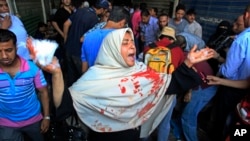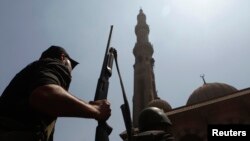CAIRO —
Egypt's Muslim Brotherhood says it will continue holding defiant protests, following violent clashes that killed about 100 people on Friday.
Brotherhood officials are urging the group's supporters to march in the coming days until ousted president Mohamed Morsi is reinstated.
On Friday, chaos descended on Egypt and its capital, Cairo, where Morsi supporters emerged from midday prayers to hold a "Day of Rage."
Health officials said most of the victims died in and around Cairo's Ramses Square. Witnesses said they saw many bodies laid out in mosques that have become makeshift morgues. Several policemen were among the dead.
Clashes also were reported in Alexandria, Fayoum, Suez, Ismailia, Tanta and El Arish.
Scattered clashes and skirmishes between Muslim Brotherhood supporters and police broke out Friday after thousands of supporters of the group marched in several locations across Egypt.
Fierce fighting between demonstrators and military forces in Cairo's Ramses Square has left dozens of people dead. Military helicopters hovered overhead. Witnesses told al-Jazerra television that there was firing from the helicopters on demonstrators in the square.
Near Ramses Square, fire engulfed the building that houses a construction company. It was not clear how the fire started.
The office of Egypt's interim president said he would hold a news conference on Saturday to talk about the latest developments.
Arab satellite channels showed Brotherhood supporters firing automatic weapons at targets beneath a main bridge in the Cairo district of Zamalek. Some witnesses said the protesters were firing at police while others said they were firing at residents of the area.
Retired Egyptian General Hossam Suweillam told al-Arabiya TV that the Brotherhood was “committing acts of terrorism,” saying that it has a “long history of violence.”
A top Islamic cleric delivered a Friday prayer sermon on state TV, calling on all Egyptians to eschew violence and for political leaders to sit down at the negotiating table:
He warned Egyptians against sectarian strife and asked them to refrain from bloodshed and of the taking of innocent lives.
Egyptian state media warned people to stay off the streets in Cairo as an operation to confront what it calls "terrorist elements" unfolds. Witnesses reported hearing crackles of gunfire in several areas of Cairo.
Arab satellite channels reported that at least a dozen police stations were attacked and police and army conscripts were killed in Cairo and several provincial cities.
Heba Morayef, an official with Human Rights Watch, said that the use of live ammunition by police was not acceptable and urged forces to use restraint.
Morayef urged police to take a number of steps to forestall further violence, especially against churches and Egypt's Christian minority, which were reportedly targeted this week by Brotherhood mobs.
“The other thing we want to see from the police is effective intervention to protect churches because over the last few days more than 30 churches were attacked around the country. And that is a clear obligation on the part of the police. They could have predicted that this would happen, that there would be a sectarian backlash in particular after weeks of sectarian discourse on the part of the Muslim Brotherhood and their supporters from the two sit-ins,” he said.
An Egyptian satellite channel showed images of a church in Cairo's Shubra district being torched Friday evening, after a government curfew was to have gone into effect. There were no indications that the unrest would subside despite the curfew.
Brotherhood officials are urging the group's supporters to march in the coming days until ousted president Mohamed Morsi is reinstated.
On Friday, chaos descended on Egypt and its capital, Cairo, where Morsi supporters emerged from midday prayers to hold a "Day of Rage."
Health officials said most of the victims died in and around Cairo's Ramses Square. Witnesses said they saw many bodies laid out in mosques that have become makeshift morgues. Several policemen were among the dead.
Clashes also were reported in Alexandria, Fayoum, Suez, Ismailia, Tanta and El Arish.
Scattered clashes and skirmishes between Muslim Brotherhood supporters and police broke out Friday after thousands of supporters of the group marched in several locations across Egypt.
Fierce fighting between demonstrators and military forces in Cairo's Ramses Square has left dozens of people dead. Military helicopters hovered overhead. Witnesses told al-Jazerra television that there was firing from the helicopters on demonstrators in the square.
Near Ramses Square, fire engulfed the building that houses a construction company. It was not clear how the fire started.
The office of Egypt's interim president said he would hold a news conference on Saturday to talk about the latest developments.
Arab satellite channels showed Brotherhood supporters firing automatic weapons at targets beneath a main bridge in the Cairo district of Zamalek. Some witnesses said the protesters were firing at police while others said they were firing at residents of the area.
Retired Egyptian General Hossam Suweillam told al-Arabiya TV that the Brotherhood was “committing acts of terrorism,” saying that it has a “long history of violence.”
A top Islamic cleric delivered a Friday prayer sermon on state TV, calling on all Egyptians to eschew violence and for political leaders to sit down at the negotiating table:
He warned Egyptians against sectarian strife and asked them to refrain from bloodshed and of the taking of innocent lives.
Egyptian state media warned people to stay off the streets in Cairo as an operation to confront what it calls "terrorist elements" unfolds. Witnesses reported hearing crackles of gunfire in several areas of Cairo.
Arab satellite channels reported that at least a dozen police stations were attacked and police and army conscripts were killed in Cairo and several provincial cities.
Heba Morayef, an official with Human Rights Watch, said that the use of live ammunition by police was not acceptable and urged forces to use restraint.
Morayef urged police to take a number of steps to forestall further violence, especially against churches and Egypt's Christian minority, which were reportedly targeted this week by Brotherhood mobs.
“The other thing we want to see from the police is effective intervention to protect churches because over the last few days more than 30 churches were attacked around the country. And that is a clear obligation on the part of the police. They could have predicted that this would happen, that there would be a sectarian backlash in particular after weeks of sectarian discourse on the part of the Muslim Brotherhood and their supporters from the two sit-ins,” he said.
An Egyptian satellite channel showed images of a church in Cairo's Shubra district being torched Friday evening, after a government curfew was to have gone into effect. There were no indications that the unrest would subside despite the curfew.





